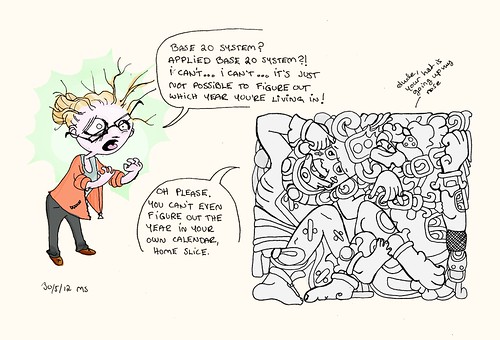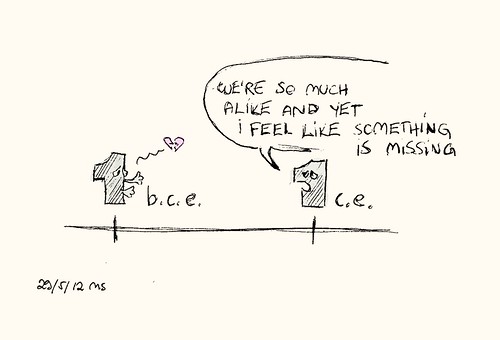
I went on a public (that is: free) lecture last Tuesday called The End Of The World 2012? A Journey In Time Into The Mayan Culture. Why? Because it was free and hey, it was a lecture by an actual professor (Harri Kettunen) on this very popular 2012 jive.
A couple of things: The information said the lecture was to be held at lecture hall 1001 which turned out to be a classroom. Nothing against classrooms, but they're very small in comparison. A classroom =/= a lecture hall.
The second thing: when you name your lecture like the above, you run a very high probabilty that a certain percentage of the attendees are... well... governing a different sort of a world view.
I went because I wanted to start to get a feel of how it is to be a university student. Apart from being stuck in a classroom with near 100 other people, it was quite nice actually. It's not exatly my field of interest/study. Not exactly, though it sort of is. But never mind. The best part is to come (and I did learn good things on this lecture).
What with the populistic name and the fringy type of personalities the lecture had attracted (which you could point out on their eagerness to take notes on such an Earth shattering (narf) mythological/premonitional concept, I wasn't really expecting this to be anything I hadn't already heard.
I was wrong.
Within the first 45 minutes (the lecture was about an hour and a half) it became apparent that this wasn't a populistic lecture on the omens and foretellings and general mythological awesomeness of the mayans, but instead a lecture on their awesomeness as astronomers, their linguistical principles and mathematics. And by the 45 minute mark, the people who came there to hear all that pop gubbins that's been polluting the media with visions of the apocalypse, had stopped taking notes.
I did giggle, because I'm an evil person.
So what did I learn? Well, besides the fact that yes, Mayans were incredibly skilled in astronomy, they appear to have been kind of dicks. I'm not even talking about human sacrifices. To each their own. I'm talking about them being about as straight forward about the use of language as cockneys. Or ze internerdz who communicate xklusivly via LOLcat-speak. If it sounds vaguely like a word that means something entirely different, they're going to make a play on words. And they're going to use different "fonts", as in the same numeral can be written in at least 3 different ways, not counting all the decorations they might throw in. The Mayan figure in that thar drawing is a full body version of the number 0 (zero). Yes, a version, not the version, because there are several and there might be more than we know.
Sidenote: I actually have a book on Mayan numerals on my desktop, just haven't read it, so I'm not equiped to say if the variation is down to individual artist interpertations or if there are similar figures used and the variation is more georaphical.
Which brings us neatly to the next point of why Mayans were dicks: unlike our numerical system which is base 10, they used a base 20 system. This bit is something I didn't grasp and you'll have to google how it works. It's not hard, it just takes concetration. But wait, there's more to it than that! Not only did the Mayans use a base 20 system, but they used several different kinds depending on the area they were living in.
Can you see why I'm calling them dicks now?
Yes, they didn't use a simple, straightforward base 20 counting system, but varied that between 18 and 16.
For the record, 18 seemed to be the more popular.
You think this is all a bit arbitrary? It's really only a little. Most things Mayans cared to count would in some way or another be derived from the movement of the planets, so while the counting methods are infuriating, they usually all line up to the cycles of a planet or another in our solar system.
Which is pretty darn neat.
Ok, so what about this end of the world 2012 business then?
Besides being based on something an american professor (who is coming to Finland at the end of this year for a seminar on the Mayas and I could image will then and has already been getting a lot of flack for setting forward these sorts of ideas) once wrote in his book on the Mayan culture. He made a very general and vague reference that someone, at somepoint, might have suggested that the world would end in 2012. Apparently there's a piece of stone monument, the kind that were very popular with the Mayan rulers, that states something the ruler of that period of that area of the mayan kingdom did at the time, will happen again in 2012 because it has happened before in ancient times before said ruler was even a twinkle in their great grandparents' eyes.
This isn't special.
Mayans had a notion of things that have happened sometime in prehistoric, mythical times, happening over and over again. Which you can say is kind of true. Things do have a tendency to repeat themselves, if only because there are only so many things people and animals can do. So let's say that I eat porrige today at 6am, it is likely that someone, at some point of history has also eaten porrige at 6am and someone, somewhere, will eventually eat porrige at 6am after me.
It's also true on larger scale that similar patterns do repeat themselves with slight variation.
And I have to mention at this point that even this bit about the Mayas isn't as simple as it looks as apparently their cyclical thinking isn't exactly the same as ours in that their cycles aren't quite what we're used to.
Why 2012? Why not? There are Mayan writings that reference things happening in 4000-something in our calendar. And there probably have been references to a great many other dates, but either the jungle or time or whatever circumstances have destroyed those writings. In 2012 a baktun cycle in the Mayan calendar does come to an end, however, as a baktun is 144 000 days, that has happened quite a few times before with little effect.
And you know what else I learned besides all this about base 20 maths being hard and our westerncentric-thinking making it harder for us to understand another culture and Mayans being so awesome at maths that they counted the lunar cycle with 26second accuracy with just their maths?
That apparently us westerners don't even know how to do calendars.
You remember that bit where a bunch of people at the eve of 2000 were all like "Well, the new millenia doesn't even start until 2001!" and the general populace was all like "Wut? U crazy bro" and went on celebrating like it was 1999?
I was in the latter camp because frankly, that made sense. If you're turning 5, the week before you turn 5, you have been alive 4 years and 51 weeks. The day after you turn 5, you have been alive for 5 years and a day. Right? It doesn't get any easier than this!
Unles you're the gregorian calendar and you don't know what a zero is.
Yes, the fault in our current global calendar is that it doesn't have a year zero. We go from year 1 Before Current Era (or Before Christ) straight to year 1 Current Era (or Anno Domini... whatever words you want to use). What that means in practical terms is that if you really wanted to count how long we've been in our current era, we'd still hadn't gotten to year 2012. We'd be at 2011 and 5 months and a handful of hours.
See what I did there? That's because we're also lacking a month 0 (zero) and a day 0 (zero).
And if you find all of this confusing, don't worry, there are people with academic degrees who make mistakes in counting our calendar years. :)

No comments:
Post a Comment